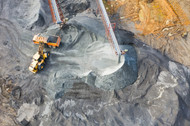Which industrial air compressor should you use for…
Posted by AVP on Feb 28th 2020
Industrial air compressors are common tools that are known about and play an important role in most people’s everyday life. An air compressor can be the only option for some industries that require a steady and reliable flow of power and the safety of a non-heat producing power source. Since the first mechanical air compressor was manufactured over 100 years ago, the demand for compressed air systems have gradually increased from it’s origins of better equipping the mining and metal fabrication industry to a necessity in almost all industries. Many consider it the fourth utility following electric, water, and gas.

Air compressors can be used in many industrial arenas:
- Air Vending for Gas Stations
- Breeding/hatching of Fish (aeration)
- Tire Inflation
- Stapling/Nailing/Framing/Riveting
- Caulking Guns
- Coin Counting Machines
- Post Office Stamping Device
- Bill Counting Machines
Our Recommendation
A wide range of industrial fields and services rely on the usage of an air compressor to complete simple and/or mundane tasks. Werther International Inc's extensive line of complete silent air compressor packages provide a turn key solution and an easy installation and start up for most applications needing a source of quiet compressed air. Our ultra silent compressors incorporate 3 different quiet motors with a choice of 8 internally coated air tanks. With so many options we are able to offer a wide range of compressors meeting North American CSA, CSA/US and international CE safety standards and have adopted ISO 9001 and ISO 13485 quality control manufacturing procedures to ensure our products can be easily used throughout the world.
For most of these projects we would recommend one of our Panther Silent Mini Air Compressors, or one of our Panther Oil-Free Mini Air Compressors. Both types of compressors offer outstanding performance and value for those who demand the most quiet, dependable, clean air systems.
Helpful Terms to Know
- PSI—PSI is a unit of pressure expressed in pounds of force per square inch of area. It stands for Pounds per Square Inch. Each type of air compressed tool requires its own rating. For example, a spray gun usually needs 50 PSI, while a nailer often requires 90 PSI. Single-stage compressors can normally handle a combined 135 PSI, which will suffice for most garage-scale operations.
- CFM—CFM stands for Cubic Feet per Minute. When choosing a compressor, the most critical factor to note is its CFM rating, because that will determine the number of tools that you’ll be able to operate at one time, as well as the overall power capacity. Each tool that you connect to a compressor will have its own CFM needs, so it’s best to choose a unit with maximum CFM. This will ensure that your compressor properly runs the full array of tools in your supply. Tools that demand the highest CFM include grinders, sanders and other pieces of equipment that often run continuously. Tools that are only used intermittently, such as glue guns, tend to require lower CFM ratings.
- Horsepower—An air compressor’s power measurement is known as its horsepower (HP). In a compressor, this would apply to the motor. Depending on the size or design of a compressor, it could boast anywhere from 1.5 to 500 HP. Compressors with high HP tend to be more flexible and generate higher CFM/HP.
- SCFM—This stands for “Standard Cubic Feet per Minute,” which means CFM on the extremely rare machines that have nothing but standard conditions. Though this term rarely applies to air compressors anymore, it’s worth knowing about should you ever encounter this acronym.
Trust the Experts
At AVP, we know a thing or two about air compressors. Call us for an expert recommendation at (281) 866-9700 or check out our store at shop.airvacuumprocess.com.
